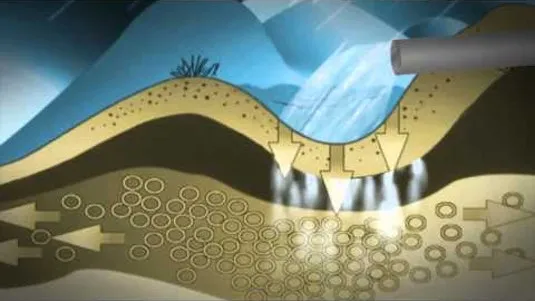
Drinking Water Treatment 
This online course focuses specifically on the treatment of drinking water, covering topics such as source water quality, treatment processes, and disinfection. Students will learn how to design and operate drinking water treatment systems to achieve high-quality drinking water. ▼
ADVERTISEMENT
Course Feature
![]() Cost:
Cost:
Free
![]() Provider:
Provider:
Edx
![]() Certificate:
Certificate:
Paid Certification
![]() Language:
Language:
English
![]() Start Date:
Start Date:
Self paced
Course Overview
❗The content presented here is sourced directly from Edx platform. For comprehensive course details, including enrollment information, simply click on the 'Go to class' link on our website.
Updated in [April 12th, 2023]
This course, Drinking Water Treatment, provides an overview of conventional technologies for drinking water treatment. It covers the physical, chemical and biological processes involved in the treatment chain, and the effect of treatment on water quality. After completing the course, students will be able to recognize the process units, describe their function, and make basic calculations for a preliminary design of a drinking water treatment plant.
The course consists of four modules: Introduction to drinking water treatment, Water quality, Groundwater treatment, and Surface water treatment. In each module, students will learn to identify the drinking water quality parameters to be improved, calculate the dimensions of the treatment processes, and draw treatment schemes.
This course is part of the Water XSeries, by DelftX, which also includes the courses Introduction to Water and Climate and Introduction to the Treatment of Urban Sewage.
[Applications]
After completing this course, one should be able to apply the knowledge gained to design a drinking water treatment plant. This includes being able to identify the drinking water quality parameters to be improved, calculate the dimensions of the unit processes in the treatment chain, and draw the treatment schemes. Additionally, one should be able to recognize the process units and describe their function. Furthermore, the course can be combined with other courses in the Water XSeries, by DelftX, to gain a more comprehensive understanding of water and climate, and the treatment of urban sewage.
[Career Paths]
1. Drinking Water Treatment Engineer: Drinking water treatment engineers are responsible for designing, constructing, and maintaining drinking water treatment systems. They must be knowledgeable in the principles of water chemistry, hydraulics, and engineering. They must also be able to identify and solve problems related to water quality, water supply, and wastewater treatment. The demand for drinking water treatment engineers is expected to grow as the population increases and the need for clean drinking water becomes more pressing.
2. Water Quality Analyst: Water quality analysts are responsible for monitoring and analyzing the quality of water in a variety of settings. They must be knowledgeable in the principles of water chemistry, microbiology, and engineering. They must also be able to identify and solve problems related to water quality, water supply, and wastewater treatment. The demand for water quality analysts is expected to grow as the population increases and the need for clean drinking water becomes more pressing.
3. Water Treatment Plant Operator: Water treatment plant operators are responsible for the operation and maintenance of water treatment plants. They must be knowledgeable in the principles of water chemistry, hydraulics, and engineering. They must also be able to identify and solve problems related to water quality, water supply, and wastewater treatment. The demand for water treatment plant operators is expected to grow as the population increases and the need for clean drinking water becomes more pressing.
4. Water Resources Manager: Water resources managers are responsible for managing the use of water resources in a variety of settings. They must be knowledgeable in the principles of water chemistry, hydrology, and engineering. They must also be able to identify and solve problems related to water quality, water supply, and wastewater treatment. The demand for water resources managers is expected to grow as the population increases and the need for clean drinking water becomes more pressing.
[Education Paths]
1. Bachelor of Science in Environmental Engineering: This degree program focuses on the application of engineering principles to the protection and management of the environment. Students learn about the principles of environmental engineering, including water and wastewater treatment, air pollution control, hazardous waste management, and environmental law. They also gain an understanding of the environmental impacts of human activities and how to mitigate them. This degree is becoming increasingly important as environmental issues become more pressing.
2. Master of Science in Water Resources Engineering: This degree program focuses on the management of water resources, including the design and operation of water systems, water supply and wastewater treatment, and water quality management. Students learn about the principles of hydrology, hydraulics, and water resources engineering, as well as the environmental impacts of water resources management. This degree is becoming increasingly important as water resources become more scarce and the need for efficient management of these resources grows.
3. Doctor of Philosophy in Environmental Engineering: This degree program focuses on the application of engineering principles to the protection and management of the environment. Students learn about the principles of environmental engineering, including water and wastewater treatment, air pollution control, hazardous waste management, and environmental law. They also gain an understanding of the environmental impacts of human activities and how to mitigate them. This degree is becoming increasingly important as environmental issues become more pressing.
4. Master of Science in Environmental Science: This degree program focuses on the study of the environment and its interactions with human activities. Students learn about the principles of environmental science, including ecology, geology, hydrology, and atmospheric science. They also gain an understanding of the environmental impacts of human activities and how to mitigate them. This degree is becoming increasingly important as environmental issues become more pressing.
Course Provider

Provider Edx's Stats at AZClass
Focusing specifically on drinking water treatment, this online course covers topics such as source water quality, treatment processes, and disinfection. Learners can learn about the process units involved in drinking water treatment such as filtration, sedimentation, coagulation, flocculation and disinfection. They can also learn to describe the function of each process unit and perform basic calculations for the preliminary design of drinking water treatment plants. Learners gain knowledge of drinking water quality parameters that need improvement as well as treatment training or programs that need improvement. They can also learn to identify parameters to monitor and methods to measure them.
Discussion and Reviews
0.0 (Based on 0 reviews)
Explore Similar Online Courses

JMeter Tutorial 1: Introduction to Performance Testing

Objective-C Programming Tutorials

Python for Informatics: Exploring Information

Social Network Analysis

Introduction to Systematic Review and Meta-Analysis

The Analytics Edge

DCO042 - Python For Informatics

Causal Diagrams: Draw Your Assumptions Before Your Conclusions

Whole genome sequencing of bacterial genomes - tools and applications

Educating for Sustainable Development (ESD) in Schools and Universities

Potable water treatment


Start your review of Drinking Water Treatment